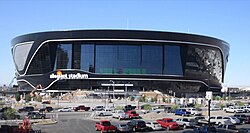| This article is part of series of |
| Las Vegas Raiders history |
|---|
| Oakland Raiders (1960–1981) |
| Los Angeles Raiders (1982–1994) |
| Oakland Raiders (1995–2019) |
| Relocation to Las Vegas |
| Las Vegas Raiders (2020–present) |
| List of seasons |
This is a list of seasons completed by the Las Vegas Raiders American football franchise of the National Football League (NFL). The list documents the season-by-season records of the Raiders' franchise from 1960 to present, including postseason records, and league awards for individual players or head coaches. The team originated in Oakland, California as the Oakland Raiders, where they first played 22 seasons from 1960 to 1981. From 1982 to 1994, the team played 13 seasons in Los Angeles as the Los Angeles Raiders, before returning to Oakland in 1995. The team played 25 seasons in its second stint in Oakland from 1995 to 2019. In 2017, the Raiders officially announced their relocation from Oakland to the Las Vegas metropolitan area. In 2020, the Raiders began play as the Las Vegas Raiders at the newly constructed Allegiant Stadium.

From 1960 to 2023, the franchise has played a total of 64 seasons. The Raiders have won one AFL championship and three Super Bowl titles. The team won the AFL Championship in 1967 prior to the 1970 AFL–NFL merger and lost their first Super Bowl appearance in Super Bowl II. The franchise would go on to win their next three Super Bowl appearances in Super Bowl XI, Super Bowl XV, and Super Bowl XVIII. Only five teams have appeared in more Super Bowls than the Raiders: the New England Patriots (11), Dallas Cowboys (eight), Pittsburgh Steelers (eight), Denver Broncos (eight), and San Francisco 49ers (seven); the Raiders’ five appearances are tied with the Green Bay Packers, Los Angeles Rams, Miami Dolphins, New York Giants, and the Washington Commanders. [1]